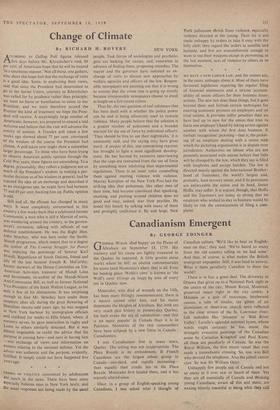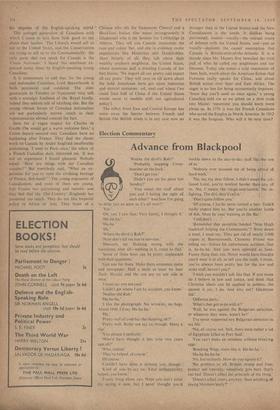Canadianism 'Emergent
By GEORGE EDINGER
GENERAL WOLFE `died happy' on the Plains of Abraham on September 13, 1759. His memory and his cause are lightly treasured in the Quebec he captured. A little granite stone marks where he fell; an obelisk commemorates' his name (and Montcalm's also); that is all. Even his landing place 'Wolfe's cove' is known as 'the Wolf's cove' (Gorge du loup) by nine of every ten in Quebec now.
Montcalm, who died of wounds on the 14th, has been more fittingly commemorated; there is a square named after him, and his statue dominates the Heights of Abraham. But both are very much past history in present-day Quebec, for both evoke the era of colonialism—and that is no more popular in Canada than it is in Pakistan. Memories of the two commanders have been eclipsed by a new force in Canada : Canadianism.
I met Canadianism first in lower town, Quebec. The setting was not inappropriate. The Place Royale is its embodiment. If French Canadians are the largest ethnic group in Canada—one-third, and rapidly increasing— then equally their cradle lies in the Place Royale. Montcalm first landed there, and it has scarcely altered since.
Once, in a group of English-speaking young Canadians, I was asked what I thought of Canadian culture. 'We'd like to hear an English- man on that,' they said. 'We've heard so many from the old country telling us we had none.' And that, of course, is what makes the British immigrant unpopular. Still, it was hard to answer. What is there peculiarly Canadian to show the world?
There is in fact a great deal. The driveway in Ottawa that gives on to a National Park right in the centre of the city; Mount Royal, Montreal, preserved intact tight in the city centre; a Mountie or a pair of mocassins, birchwood canoes, a tube of insulin, the glitter of an aluminium or sheet-iron church spire reflected in the clear stream of the St. Lawrence river; folk melodies like 'Alouette' or 'Red River Valley'; Lavalle's splendid national hymn, whose words might certainly be less inane; the strangely evocative paintings of the Canadian scene by Cornelius Krieghoff and Paul Kane; all these are peculiarly of Canada. So was the Royal William, the first steam vessel that ever made a transatlantic crossing. So, too, was Bell who devised the telephone. Also the Fobalt cancer cure. So was Sir William Osler.
Unhappily few people out of Canada and not so many in it ever saw or heard of them. Yet they are all essentially of Canada and thinking young Canadians, aware of this and more, are waxing bitterly resentful at being what they call
the stepsons of the English-speaking world.
This younger generation of Canadians with which I came to mix have little good to say about their leaders. The Liberals would sell us out to the United States, and the Conservatives are trying to sell us to the Commonwealth: the only party that can speak for Canada is the Union Nationale.' I heard this sentiment ex- , pressed many times by English-speaking young Canadians.
It is unnecessary to add that, for the young and nationalist Canadian, Lord Beaverbrook is both provincial and outdated. The older generation in Toronto or Vancouver may talk with a nostalgic fondness of the Royal family, indeed they seldom talk of anything else. But the young vibrant forces of Canadian nationalism are not particularly moved, much as their representatives abroad conceal the fact.
Save for a vague respect for Charles de Gaulle ('he would get a warm welcome here,' a Union deputy assured me), Canadians have no hankering after France. They find the classic work on Canada by Andre Siegfried insufferably patronising. went to Paris once,' the editor of a French Canadian daily informed me. 'It was not an experience I found pleasant. Nobody asked, "How are things with our Canadian cousins?" But everybody said, "What an ex- perience for you to meet the civilising heritage of France, first-hand."' The young exponents of Canadianism, and most of them are young, find France too patronising and remote; and they feel that the 'Old Country' (England) has presumed too much. They do not like Imperial policy in Africa or Asia. They boast of a Chinese who sits for Vancouver Central and a Blackfoot Indian (the name incongruously is Gladstone) who is the Senator for Lethbridge in Alberta. They tell you Canada transcends the race and colour bar, and cite in evidence exotic populations like Hutterites and Doukhobors. Most bitterly of all, they talk about their wealthy southern neighbour, the United States, whose economic pull is draining Canada of her best brains. 'We import all our poetry and export all our poets.' They will rave on till dawn about the hold Americans have got upon industries and natural resources: oil, steel and wheat ('we could feed half of China if the United States would cease to meddle with our agricultural pol icy').
The influx from East and Central Europe has worn away the barrier between French and British (the British strain is in any case now no stronger than in the United States) and the New Canadianism is the result. It dislikes being patronised; resents—vocally--the mutual treaty of defence with the United States; and—just as vocally—deplores the casual assumption that Canada is Britain-west-of-the-Atlantic. It is a decade since Mr. Massey first bewailed the rival pull of what he called our neighbours and our kinsmen. Today one senses, a wild resentment of them both, wrath about the American fiction that Formosa really speaks for China, and about British action over Suez and East Africa. The anger is no less for being momentarily impotent. 'Some day you'll need us once again,' a young Canadian told me as we jolted on a slow train into Maine; 'meantime you should learn more about us. In 1776 it was the French Canadians who saved the Empire in North America. In 1812 it was the Iroquois. Who will it be next time?











































 Previous page
Previous page